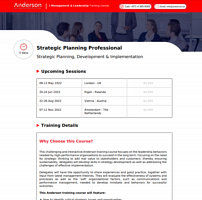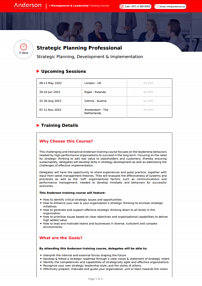- Course Finder
- Formats
- Training Topics
- Business Strategy
- Management & Leadership
- Personal Development Skills
- Innovation & Creativity
- Emotional Intelligence
- Governance and Compliance
- Business & Life Synergy
- Business Agility
- Business Sustainability
- Executive & Administrative Support
- Customer Service
- Sales & Marketing
- Human Resource HR Management
- Finance & Budgeting
- Data Science and Protection
- Project Management
- CertNexus
- Special Courses
- 10 Day Seminars
- The Essential Skills
- The Advanced Skills
- The Mini MBA Series
- Bootcamps
- Training Venues
-
- Certificates
- Calendars
- About us
- الدورات العربية
We currently have no scheduled session for this Training Course. If you are interested in running this course, please contact our Training Department at info@anderson.ae
Training Course Overview
Virtual and dispersed teams are becoming a fact of modern-day working. The Economist Intelligence Unit estimate that 62% of people in the global workforce will be conducting work remotely as a major part of their job by 2020.
The major benefits to an organisation can include reduced office/asset/equipment costs, as well as reduced environmental impact by reducing the daily commute. Your talent pool is now truly global; and many younger workers see remote working as the norm.
However, despite its major advantages, creating and managing virtual teams requires a different mindset and understanding. Are you ready for this new way of working? Do you have the right skills, knowledge and ability to create an effective virtual team within your organisation?
Training Course Objectives
By attending this Anderson training course, delegates will be able to:
- Understand the key elements in creating a virtual team
- Apply key strategies for positive human factors and behaviours with remote working
- Apply remote methods of team synergy techniques for building team communication
- Learn how to build cohesive teams in a virtual environment
- Manage performance and output of team members remotely
Designed For
This Anderson training course is suitable to a wide range of professionals but will greatly benefit those leading or managing virtual, remote or dispersed teams, including:
- Senior Managers
- Heads of Departments
- Project Managers
- Engineering Managers
- IT / Software / Systems Managers
- Commercial / Procurement Managers
- Sales / Call Centre Managers
- Team Leaders / Supervisory
Day One: The Virtual Team
- Virtual Team Leadership: defining the parameters
- Four types of teams in the workplace
- Defining a virtual team
- Characteristics of a virtual team
- Team Dynamics applied to virtual teams
- Leading and managing the virtual team: factors for consideration
Day Two: Human Factors & Behavioural Considerations
- Health and safety considerations of remote working
- Psychology of remote and dispersed working: is it for everyone?
- Emotional intelligence in virtual teamwork
- Understanding personalities in the team (team personality profile assessment)
- Motivation and individual factors for virtual teams
- Managing conflict in a virtual team
Day Three: Team Dynamics in Remote Working
- Achieving team balance
- Team stages and development
- Building teamwork remotely
- Importance of communication channels
- Active communication in virtual team environment
- Applying Group Think to build trust and empowerment
Day Four: Organising your Virtual Team: tasks and performance
- Utilising media technology to manage your team
- Delegation of work in remote teams
- Managing performance remotely
- Setting workplace objectives: control and action
- Team Objective Grid: achieving transparency and cohesion
- Controlling virtual meetings
Day Five: Developing Team Synergy
- Communicating the team vision
- Developing the team to the next stage
- Celebrating success
- Virtual team exercise
- Next steps
- Anderson Certificate of Completion will be provided to delegates who attend and complete the course
Training Course Overview
Virtual and dispersed teams are becoming a fact of modern-day working. The Economist Intelligence Unit estimate that 62% of people in the global workforce will be conducting work remotely as a major part of their job by 2020.
The major benefits to an organisation can include reduced office/asset/equipment costs, as well as reduced environmental impact by reducing the daily commute. Your talent pool is now truly global; and many younger workers see remote working as the norm.
However, despite its major advantages, creating and managing virtual teams requires a different mindset and understanding. Are you ready for this new way of working? Do you have the right skills, knowledge and ability to create an effective virtual team within your organisation?
Training Course Objectives
By attending this Anderson training course, delegates will be able to:
- Understand the key elements in creating a virtual team
- Apply key strategies for positive human factors and behaviours with remote working
- Apply remote methods of team synergy techniques for building team communication
- Learn how to build cohesive teams in a virtual environment
- Manage performance and output of team members remotely
Designed For
This Anderson training course is suitable to a wide range of professionals but will greatly benefit those leading or managing virtual, remote or dispersed teams, including:
- Senior Managers
- Heads of Departments
- Project Managers
- Engineering Managers
- IT / Software / Systems Managers
- Commercial / Procurement Managers
- Sales / Call Centre Managers
- Team Leaders / Supervisory
Day One: The Virtual Team
- Virtual Team Leadership: defining the parameters
- Four types of teams in the workplace
- Defining a virtual team
- Characteristics of a virtual team
- Team Dynamics applied to virtual teams
- Leading and managing the virtual team: factors for consideration
Day Two: Human Factors & Behavioural Considerations
- Health and safety considerations of remote working
- Psychology of remote and dispersed working: is it for everyone?
- Emotional intelligence in virtual teamwork
- Understanding personalities in the team (team personality profile assessment)
- Motivation and individual factors for virtual teams
- Managing conflict in a virtual team
Day Three: Team Dynamics in Remote Working
- Achieving team balance
- Team stages and development
- Building teamwork remotely
- Importance of communication channels
- Active communication in virtual team environment
- Applying Group Think to build trust and empowerment
Day Four: Organising your Virtual Team: tasks and performance
- Utilising media technology to manage your team
- Delegation of work in remote teams
- Managing performance remotely
- Setting workplace objectives: control and action
- Team Objective Grid: achieving transparency and cohesion
- Controlling virtual meetings
Day Five: Developing Team Synergy
- Communicating the team vision
- Developing the team to the next stage
- Celebrating success
- Virtual team exercise
- Next steps
The Certificate
-
Anderson Certificate of Completion will be provided to delegates who attend and complete the course
Info & In-house Solution
For more information about this course, call or email us at:
Call us: +971 4 365 8363



